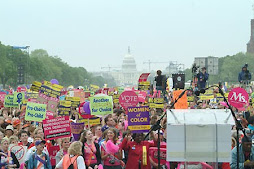When women can't access abortion, sometimes they die. It's that simple. The recent case of Salvita Halappanavar, the Irish woman who suffered and died while a hospital refused to complete a miscarriage in progress because there was still a fetal heartbeat tragically underlines this possibility. Her death highlights what happens when health policy is dictated by religion, not science.
There is no excuse for the death of this woman. Reputable, peer reviewed, scientific research has shown repeatedly that denying women access to abortion increases maternal mortality.* Now there is a new study, The Turnaway Study, that teaches us even more.**
The Turnaway Study looked at women who were "turned away" when seeking abortions versus women who received care. It both debunked myths and deepened our understanding of some of the social outcomes of denying abortion care. For example, they find that there is no proof that women who have abortions have poor mental health outcomes or a greater risk of drug use. What they did find was that women denied access to abortions are more likely to live below the poverty line one year later than their counterparts, they are more likely to be unemployed one year later, and more likely to be on public assistance one year later. Clearly, this places a cost burden on the state.
Some countries get it. France recently decided to make abortion a free service for all women, something that will inevitably save the country money. Although I would never argue the case for abortion simply because it saves the state money, the fact that it does is good. But we can't pick and choose which human rights to support by their cost. Denying human rights always has a social cost. Steven D. Levitt makes the case in Freakonomics that Roe v. Wade resulted in a decrease in the crime rate. Again, a good outcome, but not one that would comprise the main part of any argument I made supporting access to abortion.
To me, the most troubling finding of the The Turnaway Study is that women denied access are more likely to live in violent and abusive relationships one year after being turned away. They did not enter these relationships in the intervening year; they were less likely to escape them. Getting an abortion allowed women to get out of violent relationships more easily.
As reported before in this blog, laws criminalizing abortion have such terrible results for women that UN Special Rapporteur on the Right to Health condemned them on October 24, 2011, calling them an abuse of state power. That's what the situation in Ireland looks like to me.
We are fortunate in Canada. We have no law on abortion. In spite of recent rallying cries by anti-abortion zealots such as MP Woodworth and his cohort, we don't need a law. Canada's experience with the decriminalization of abortion proves that we don't need a law. The twenty fifth anniversary of the Morgentaler decision is coming up this January. Canada has a generation of women who have never known anything but a society in which abortion is a medical matter, not a legal matter, and the sky has not fallen. A recent poll shows Canadians understand the benefits of this policy on our society and the majority of Canadians support unrestricted access. It's time we take the message of this success story to the world.
--------------
Notes:
*(See any number of studies on the Guttmacher site, which has a whole section related to abortion, here.)
**(The Facebook Site linked to above has a ton of information. To keep it a little more brief, see this article by Annallee Newitz. It also includes a link to the whole study.)
Top 10 Daveberta columns of 2025
1 hour ago





